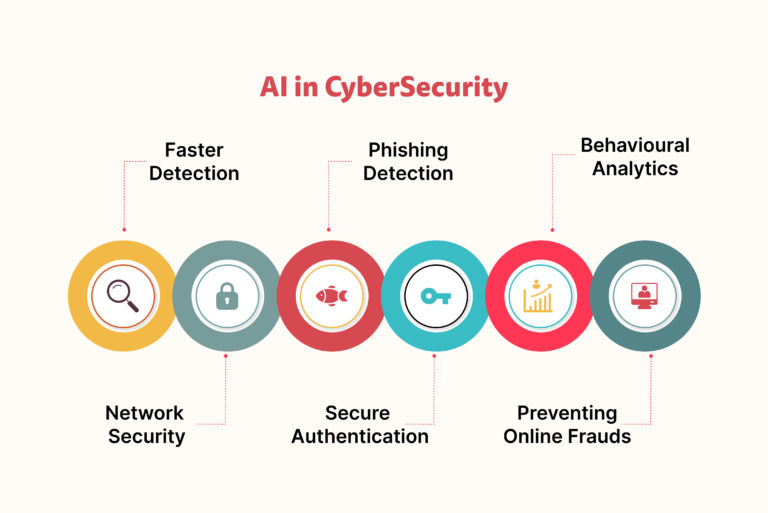Cyber Security Powered By AI

The advent of artificial intelligence (AI) has revolutionized numerous aspects of our lives, and cyber security is no exception. As the threat landscape continues to evolve, the integration of AI in cyber security has become a pressing necessity. AI-powered cyber security solutions are equipped to detect, respond, and prevent sophisticated cyber threats in real-time, leveraging machine learning algorithms, natural language processing, and predictive analytics.
Understanding the Threat Landscape
The cyber threat landscape is becoming increasingly complex, with attackers employing advanced tactics, techniques, and procedures (TTPs) to evade traditional security measures. The rise of zero-day exploits, polymorphic malware, and social engineering attacks has rendered traditional signature-based security solutions ineffective. Furthermore, the proliferation of Internet of Things (IoT) devices has expanded the attack surface, creating new vulnerabilities for attackers to exploit.
Role of AI in Cyber Security
AI-powered cyber security solutions can help mitigate these threats by analyzing vast amounts of data, identifying patterns, and detecting anomalies in real-time. Machine learning algorithms can be trained on historical data to recognize normal network behavior, enabling the identification of suspicious activity. AI-powered systems can also analyze threat intelligence feeds, social media, and dark web activity to predict potential threats and alert security teams.
Key Benefits of AI-Powered Cyber Security
- Enhanced Threat Detection: AI-powered systems can analyze vast amounts of data, identifying patterns and anomalies that may evade human analysts.
- Predictive Analytics: Machine learning algorithms can predict potential threats, enabling proactive measures to prevent attacks.
- Automated Incident Response: AI-powered systems can respond to threats in real-time, reducing the mean time to detect (MTTD) and mean time to respond (MTTR).
- Improved Incident Response: AI-powered systems can analyze incident response data, providing insights to improve response strategies and reduce the risk of future attacks.
- Reduced False Positives: AI-powered systems can reduce false positive alerts, minimizing unnecessary resource allocation and improving the overall efficiency of security operations.
Applications of AI in Cyber Security
- Network Traffic Analysis: AI-powered systems can analyze network traffic, identifying suspicious activity and detecting anomalies.
- Endpoint Security: AI-powered endpoint security solutions can detect and respond to threats on endpoint devices, such as laptops, desktops, and mobile devices.
- Cloud Security: AI-powered cloud security solutions can analyze cloud-based data, identifying potential threats and ensuring compliance with regulatory requirements.
- Identity and Access Management (IAM): AI-powered IAM solutions can analyze user behavior, detecting and preventing identity-based threats.
Step-by-Step Guide to Implementing AI-Powered Cyber Security

Implementing AI-powered cyber security solutions requires a structured approach, involving the following steps:
- Assess Current Security Posture: Evaluate current security measures, identifying vulnerabilities and areas for improvement.
- Define AI Strategy: Develop a clear AI strategy, outlining goals, objectives, and key performance indicators (KPIs).
- Select AI-Powered Solutions: Choose AI-powered cyber security solutions that align with the defined strategy, considering factors such as scalability, integration, and support.
- Configure and Deploy: Configure and deploy AI-powered solutions, ensuring seamless integration with existing security infrastructure.
- Monitor and Evaluate: Continuously monitor and evaluate AI-powered solutions, refining strategies and optimizing performance.
Comparative Analysis of AI-Powered Cyber Security Solutions

The market offers a wide range of AI-powered cyber security solutions, each with its strengths and weaknesses. When selecting a solution, consider factors such as:
- Scalability: Ensure the solution can scale to meet growing security demands.
- Integration: Choose solutions that integrate seamlessly with existing security infrastructure.
- Support: Select solutions with comprehensive support, including training, documentation, and technical assistance.
- Cost: Evaluate the total cost of ownership, considering factors such as licensing, maintenance, and upgrades.
Pro-Con Analysis of AI-Powered Cyber Security
While AI-powered cyber security solutions offer numerous benefits, there are also potential drawbacks to consider:
Pros:
- Enhanced threat detection and response
- Predictive analytics and incident response
- Improved incident response and reduced false positives
Cons:
- Dependence on high-quality data
- Potential for bias in machine learning algorithms
- Need for continuous training and updating
Future Trends in AI-Powered Cyber Security
As the cyber threat landscape continues to evolve, AI-powered cyber security solutions will play an increasingly important role in detecting, responding, and preventing sophisticated threats. Future trends include:
- Increased Adoption of Cloud-Based AI: Cloud-based AI solutions will become more prevalent, offering scalability, flexibility, and cost-effectiveness.
- Integration with IoT Security: AI-powered cyber security solutions will be integrated with IoT security measures, addressing the growing threat landscape.
- Advancements in Machine Learning: Machine learning algorithms will continue to evolve, enabling more accurate threat detection and response.
What is the primary benefit of AI-powered cyber security solutions?
+The primary benefit of AI-powered cyber security solutions is enhanced threat detection and response, enabling organizations to detect and respond to sophisticated threats in real-time.
What are the key factors to consider when selecting an AI-powered cyber security solution?
+Key factors to consider when selecting an AI-powered cyber security solution include scalability, integration, support, and cost. Ensure the solution aligns with your organization's security strategy and goals.
How can organizations implement AI-powered cyber security solutions effectively?
+Organizations can implement AI-powered cyber security solutions effectively by assessing their current security posture, defining a clear AI strategy, selecting suitable solutions, configuring and deploying solutions, and continuously monitoring and evaluating performance.
In conclusion, AI-powered cyber security solutions offer a robust defense against sophisticated cyber threats, leveraging machine learning algorithms, natural language processing, and predictive analytics. By understanding the benefits, applications, and future trends of AI-powered cyber security, organizations can make informed decisions about implementing these solutions, ultimately enhancing their cyber security posture and reducing the risk of devastating cyber attacks.


